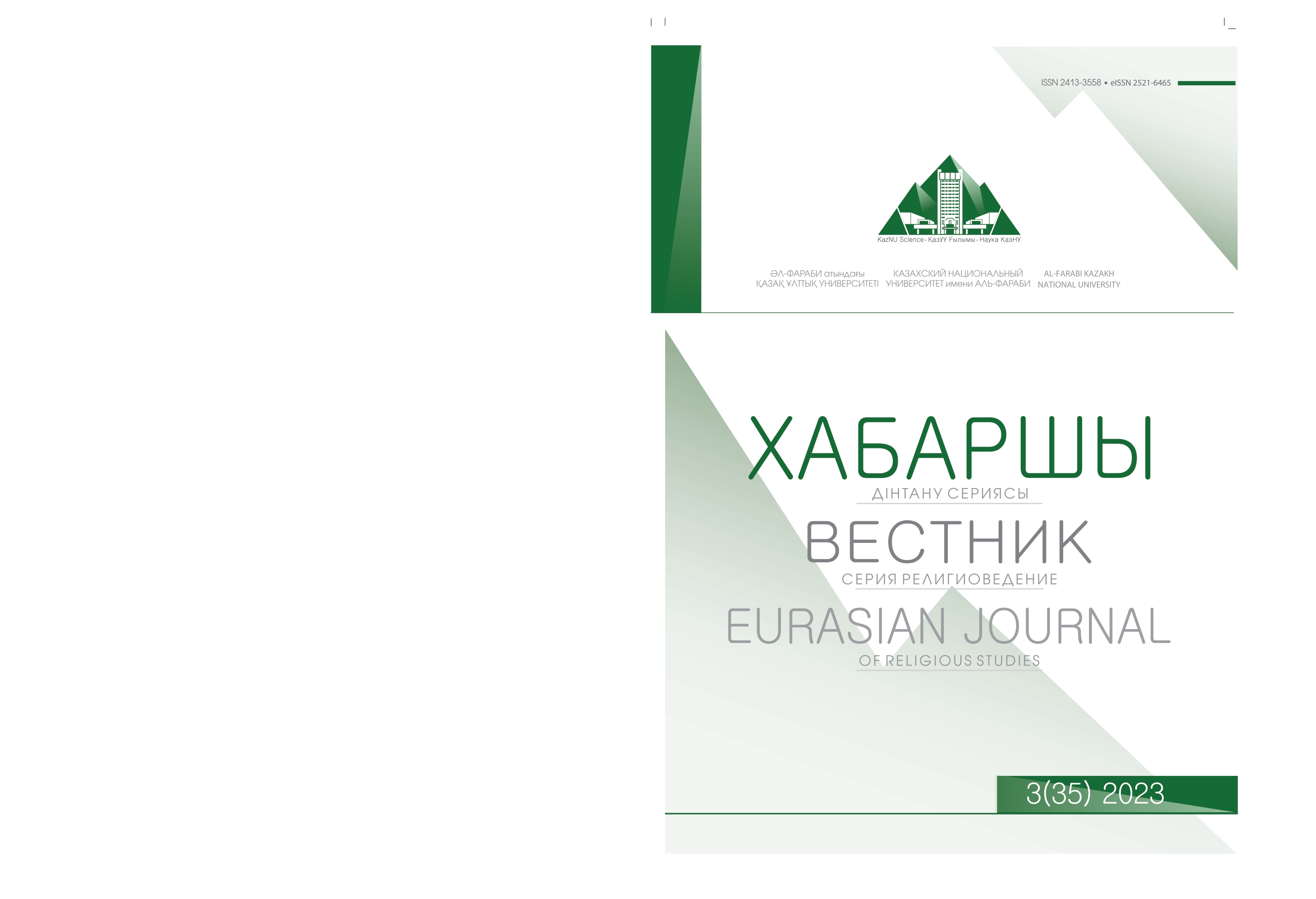The ontology of Sufism, and the view point ın the teaching of reality (being) at Sayyid Yahya Bakuvi’s views
DOI:
https://doi.org/10.26577//EJRS.2023.v35.i3.r10Keywords:
spirituality, Sufism, the way taking to God, faces of perfection, the eternal need of mankindAbstract
In the article perfection, all-round development of man is researched not only in the sphere of trustful, spiritually rich, unselfish men, but also in the high intelligence sphere of men with the definite way (mystic cognitive way), men who devoted themselves to the God, to the being. Looking to the sophism as a movement explaining the inner meanings of invisible sides(esoteric) of visible and implemented (exoteric) religion i.e. the psychology of community religions is right. Cognition of meanings of religions that formed with the birth of human and not leaves during life and cognition of the God Who created the being requires mubhemity (to be in secret).This mubhemity is also a sample of Prophets to those who want to be perfect. With this article from the motherland of xalvatiya we intend to convey to the researchers who gathered around the light of xalvatiyya and in the example of them to the whole mankind, that real tawhid that surrounds all spheres of social life, will be reached in case if all the world, all humanity will come to the same plane of humanity i.e. when a humanbeing will minimize pretentions in order to purify the spirit. Thus our aim is to show that “perfect men” will prove that this is the best way that leadss to the Haqiqat (truth – Allah) – coming from our century to the indefinite future, through making humanistic societies, achieving the equality of all nations With this message, after 550 years of his works, we again rebirth the specific philosophy of our spiritual father who perfected his life, who devoted his life live as God wants and we will remember and make the readers to remember the eternal ideas of mankind.
Key words: spirituality, Sufism, the way taking to God, faces of perfection, the eternal need of mankind.
References
Аристотель (1976) Сочинения, ред. В.Ф. Асмус, Институт философии АН. СССР. В 4-х т. Т. 2. – М.: Мысль. – 550.
Бертельс Е.Э. (1949) Абдуррахман Джами и его дружба с Навои. – Душанбе: Таджикгосиздат. – 114.
Бертельс Е.Э. (1965) Избранные труды, Суфизм и суфийская литература. Т.3. – М.: Наука. – 406.
Гегель (1929-1958) Сочинения, Лекции по эстетике / пер. с нем. П.С.Попова / в 14 томах. Т. 5. – М.: Издательство социально-экономической литературы. – 440.
Исматов Б. (1986) Пантеистическая философская традиция персидско-таджикской поэзии IX-XV вв. – Душанве: Дониш. – 256.
Крымский А.Е. (1906) Очерк развития суфизма до конца III в хиджры. – М.: тип. и словолитня О.О. Гербек. – 49.
Творчество Мухаммада Икбала, Концепция «совершенного человека» / в творчестве Джалал ад-Дина Руми и Мухаммада Икбала /. Cб. статей, М.: 1982, 251 p.136.
Фараджева Ф.Ф. (1988) Трактовка категории «субстанция» в средневековой вос¬¬точной философии (исламский регион, Х-Х111 вв.), Проблемы восточной философии, Научно-философский журнал. – Баку: Институт философия и права. №2.
Философская энциклопедия (1967) в 4-х т. Т.3. – М.: Мысль. – 226.
References
Ahmed Avni Konuk (1987) Füsus-i Hikem. Tercüme ve şerhi. – İstanbul: Dergah yayınları. (in Turkish)
Al-Kalabadhy (1966) The doctrine of the Sufis (Kitab al Ta^arrufli ahl al-tasavvuf). – Cambrige: The Universiti Press.
Aristotel (1976) Sochinenija, red. V.F.Asmus, Institut filosofii AN. SSSR [Essays, ed. by V.F.Asmus, Institute of Philosophy of the USSR Academy of Sciences]. in 4 vol., vol 2. – М.: Mysl. – 550. (in Russian)
Article Proceedings (1982) Tvorchestvo Muhammada Ikbala, Koncepcija «sovershennogo cheloveka» / v tvorchestve Dzhalal ad-Dina Rumi i Muhammada Ikbala /. Cb. Statej [Creativity of Muhammad Iqbal, the concept of the "Perfect Man" / in the works of Jalal al-Din Rumi and Muhammad Iqbal/Proceedings of articles]. – М. – 251. (in Russian)
Bertels Е.E. (1949) Abdurrahman Dzhami i ego druzhba s Navoi [Abdurrahman Jami and his friendship with Navai]. – Dushanbe: TajikStatePublish. – 114. (in Russian)
Bertels Е.E. (1965) Izbrannye trudy, Sufizm i sufijskaja literatura [Selected Works, Sufism and Sufi Literature]. Т.3. – М.: Nauka. – 406. (in Russian)
Ebu Hafs Şihabeddin Ömer es-Sühreverdi (1993) Avarifü-l mearif / Arapcadan tercüme ve hazırlayanlar Doç.dr H. Kamil Yılmaz, Doç. Dr. İrfan Gündüz ilahiyyat fakultəsi tasavvuf tarihi öyretim üyeleri/. – İstanbul: Erkam yayınları. (in Turkish)
Farajeva F.F. (1988) Traktovka kategorii «substancija» v srednevekovoj vos¬¬tochnoj filosofii (islamskij region, H-H111 vv.), Problemy vostochnoj filosofii, Nauchno-filosofskij zhurnal [Interpretation of the category "substance" in medieval Eastern philosophy (Islamic region, X-X111 centuries), Problems of Eastern Philosophy, Scientific and Philosophical Journal]. – Baku: Institute of Philosophy and Rights. №2. (in Russian)
Hegel (1929-1958) Sochinenija, Lekcii po jestetike [Essays, Lectures on aesthetics] /tr. from German. P.S.Popova/ in 14 vol. vol. 5. – М.: Social-economic literature Press. – 440. (in Russian)
Ismatov B. (1986) Panteisticheskaja filosofskaja tradicija persidsko-tadzhikskoj pojezii IX-XV vv. [Pantheistic philosophical tradition of Persian-Tajik poetry of the IX-XV centuries]. – Dushanbe: Donish. – 256. (in Russian)
Kerimova H. (1998) Sedreddin Şirazinin felsefi göröşleri, Cahan ədebi, bedii, elmi, ictimai jurnal. – Bakı: Elnur. (in Azerbaijan)
Krymskii А.Е. (1906) Ocherk razvitija sufizma do konca III v hidzhry [An essay on the Development of Sufism until the end of the III Hijri]. – М.: О.О. Gerbek Press. (in Russian)
Mammadov Z. (1986) Orta esr Azerbaycan filosofları ve mütefekkirleri. – Bakı: Azerbaycan dövlet neşriyyatı. (in Azerbaijan)
Nesefi A. (1990) İnsan-e Kamil. tr. Turkish Mehmet Kanar. – İstanbul: Dergah yayınları. (in Turkish)
Şakikhanova M. (2006) Sufizmin “Kamil İnsan” konsepsiyası. – Bakı: Teknur. (in Azerbaijan)
The Encyclopedia of Philosophy (1967) in 4 vol., 3 vol. – М.: Mysl. – 226. (in Russian)
Tusi Ebu Nesr Serrac (1996) El-Luma. İslam tasavvufu. Tasavvufla ilgili sorular ve cevablar. terc. Kamil Hasan Yilmaz. – İstanbul: Altınoluk. (in Turkish)













